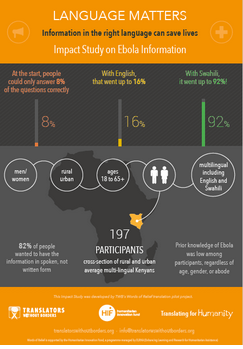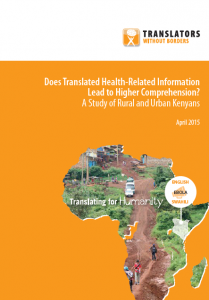DANBURY, CT, USA – 23rd July 2015 — Translators without Borders (TWB), has released the findings of an Impact Study on Ebola Information entitled ‘Does Translated Health-Related Information Lead to Higher Comprehension? A Study of Rural and Urban Kenyans’. The results of this study, demonstrate just how important it is to have crucial healthcare information widely available in local languages.
The Impact Study on Ebola Information was commissioned as part of TWB’s Words of Relief crisis program in Kenya. Words of Relief is the first translation crisis relief network intended to improve communications with communities when crisis response aid workers and affected populations do not speak the same language. Words of Relief is supported by the Humanitarian Innovation Fund, a program managed by ELRHA (Enhancing Learning and Research for Humanitarian Assistance). The objective of the study was to examine the level of comprehension of health-related information when presented in English and then the same information provided in Swahili.
197 Kenyans in urban and rural areas who spoke Swahili plus some English, were surveyed on what they knew about Ebola. Participants were asked questions about language competence and preferences and some pre-task questions on their knowledge of Ebola. Only eight per cent of participants answered basic questions on the disease correctly. They were then given an English-language information poster on Ebola prevention and symptoms and the correct answers to questions rose to 16 percent. However, when given this same poster in Swahili, respondents answered 92 percent of the questions correctly. The information was in the form of a simple poster created and translated by TWB and was used throughout West Africa after the disease had fully taken root.
“The results of the Impact Study on Ebola Information demonstrates just how important it is to provide crucial healthcare information in the local language and in the right format,” said Grace Tang, Global Coordinator, TWB’s Words of Relief program. “We will use the results of the survey to continue to raise awareness within aid organizations, that language matters and true comprehension should be considered in all development and crisis programs.”
Summary of Key Findings:

• 16 percent answered correctly when shown Ebola information in English
• 92 percent answered correctly when shown Ebola information in Swahili
• 82 percent of participants would prefer to receive health-related information in spoken format.
• Apart from information leaflets – public gatherings, church and radio were listed as preferred modes of communication for health-related information.
• Prior knowledge of Ebola was low among participants, regardless of age, gender, or abode.
• Reading of the English poster did not lead to any increased comprehension of Ebola.
• Reading of the Swahili poster led to a significant increase in comprehension of Ebola.
See the full findings and results of the Impact Study by clicking on the image.
How Can You Help TWB?
By Donating. We are a small team and need funding to help keep TWB operating. Please consider even a small amount. To donate, please click here.
By signing up for our Quarterly Newsletter and Monthly Updates.Our communications won’t overcrowd your inbox but will keep you up to date all on the crisis, health and education work that TWB does around the globe. To sign up for our newsletter, please click here.
If you are a trained translator, please consider joining our Workspace. In the Workspace, we do ongoing translation work for our non-profit partners. To sign up, please complete the volunteer form.
To view the Translators without Borders videos, please click here.
You can also follow TWB on Twitter, @TranslatorsWB

